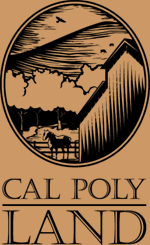| A Journey Through Poly Canyon | |
|
After
hours spent in the halls and classrooms of Cal Poly, a warm day
under the sun was beginning to seem luxurious. I was in the mood
to lose myself; or, more specifically, escape the stern looks
of professors and the piles of un-finished homework that needed
to complete. Although I could run throughout Poly Canyon (which
is popular among students), I decided to take a walk and absorb
the environment, enjoying the beautiful landscape many visitors
seem to jog past without a second glance. That choice, I realize,
has made all the difference. A tall, sturdy looking California Bay Laurel loomed into view, reorienting me to the time and place. I awoke from my contemplative state and skipped down the path, in search of everything but company. This truly was a “delicious solitude.” The tree leaves surrounding me had taken on a more glossy appearance, helping to combat the excess sunlight. It seems as though the eager spring sun had peaked through the gloomy clouds of winter with a bit too much force for the strength of the woodland. Laughingly, I thought that I, like the tree, had taken on a more “glossy appearance” after the winter season’s troubles had impacted my state. Every human is susceptible to too much pain, and humans, like the trees, react to debilitating emotions with a defensive cover. Of course, after three to four months a tree will lose the highly glossy cover, and I, like the tree, will forget my troubles and return back to my standard shade of green. Suddenly, the sound of squeaking wheels interrupts
my train of thought. A mountain biker nods hello and continues
his rocky adventure into the canyon. I pity the man or woman that
can ride past this area of Riparian woodland and flowers without
a second thought concerning its beauty. Moving on, I began to
tiptoe down the creek path, hoping not disturb any of the natural
setting with my presence. Overcome with glee, I excitedly splash
in the creek, and the water, rippling with my movement, began
to bring life to the surface. I spotted tadpoles and fish scurrying
to hide their existence, water slugs and insects in uproar, and
broken reeds floating to the surface and traveling lazily down
the stream. A Bullfrog
sits arrogantly by the creek bed, and in silence watches my antics,
viewing me without a worry of danger. He must know that I am a
foreigner in this native, natural land. Ignoring the frog’s
conceit, I struggle to spot a Rainbow
Trout or perhaps a slimy, slippery Monterey salamander, whose
reddish-brown back blends into the swirling creek colors of blues,
browns, greens, and reds. Rather than discovering an amphibian,
a high pitched whistle catches my attention and the unmistakable
coat of the Lesser Goldfinch swoops throughout the tree tops.
It seems as though I have yet another addition to my creek bed
audience. His yellow belly reflects the sun as he sits perched
on a branch, singing to me the sweet, but mournful songs that
protect his territorial boundaries. Despite my irritation with mankind, I breathed deeply and felt, with much happiness, that I love my life, my living, and everything that we have in this world. I love the brilliance of colors, the shimmering of waters, and the sound of earth. Despite our concrete jungles and social standards, I knew, then, that I have a place to escape. I said farewell to the Western Toad, Rainbow Trout, Lesser Goldfinch, and Salamander, listening intently and knowing that although silence prevailed, I could have sworn I heard “goodbye” in return.
|
|
|
|
